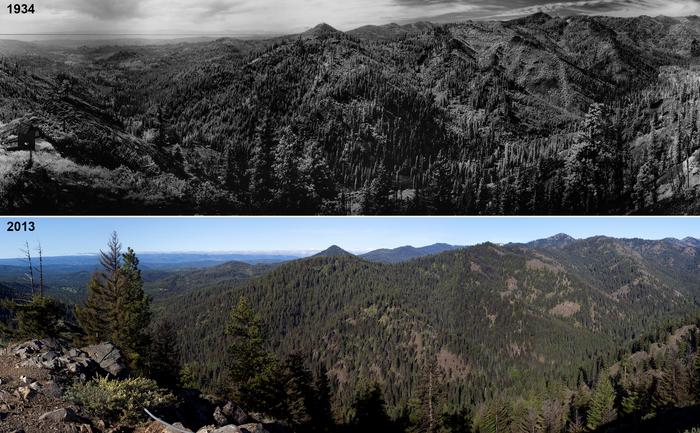Link to release:

Credit: National Archives and Records Administration/John Marshall
Link to release:
Link to related coverage:
FROM: James Urton
University of Washington
206-543-2580
jurton@uw.edu
(Note: researcher contact information at end)
For Immediate Release
April 10, 2024
There are 154 national forests in the United States, covering nearly 300,000 square miles of forests, woodlands, shrublands, wetlands, meadows and prairies. These lands are increasingly recognized as vital for supporting a broad diversity of plant and animal life; for water and nutrient cycling; and for the human communities that depend on forests and find cultural and spiritual significance within them. Forests could also be potential bulwarks against climate change. But, increasingly severe droughts and wildfires, invasive species, and large insect outbreaks — all intensified by climate change — are straining many national forests and surrounding lands.
A report by a team of 40 experts outlines a new approach to forest stewardship that “braids together” Indigenous knowledge and Western science to conserve and restore more resilient forestlands. Published March 25, the report provides foundational material to inform future work on climate-smart adaptive management practices for USDA Forest Service land managers.
“Our forests are in grave danger in the face of climate change,” said Cristina Eisenberg, an associate dean of forestry at Oregon State University. “By braiding together Indigenous knowledge with Western science, we can view the problems with what is known as ‘Two-Eyed Seeing,’ to develop a path forward that makes our forests more resilient to the threats they are facing. That is what this report is working to accomplish.”
Eisenberg co-led the report team with Susan Prichard, a fire ecologist in the School of Environmental and Forest Sciences at the University of Washington.
“Climate change is stressing these forests even as they are considered for their potential role in slowing rates of climate change,” said Prichard. “We want this report to provide not just guidance, but also hope — hope in the practical measures we can take now to promote resiliency and help forests thrive.”
Initiated by interest from the Forest Service on Indigenous knowledge and Western science, the report stems from direction to protect old and mature forests outlined in Executive Order 14072, signed by President Joe Biden in April 2022. These types of forests, some hundreds of years old, are often dominated by larger trees, with fewer seedlings and saplings. Some management practices over the past century have made many of these forests vulnerable to drought, fire, insects and other stressors, all of which will likely increase with climate change.
The executive order included guidance on strengthening relationships with tribal governments and emphasized the importance of Indigenous knowledge, a theme highlighted repeatedly in the new report. This knowledge includes the time-tested practices of Indigenous stewardship that for millennia shaped forest structure and species composition. Following European colonization, these practices were sharply curtailed by genocide, displacement, and forced assimilation of Indigenous peoples. Western scientists increasingly recognize that Indigenous stewardship practices built and maintained forests that were more resilient and ecologically diverse than today.
Many Indigenous cultures, for example, used a practice called intentional burning — also known as cultural burning — which decreased forest density, promoted healthy understory growth, and hosted a broad diversity of plant and animal life. These practices over time yielded “mosaics” of forests made up of diverse patches of trees varying in age, density, and overstory and understory composition. These “mosaic” forests are less prone to the types of large, severe wildfires that have burned swathes of North American forests this century, according to Prichard.
Other members of the core leadership team for the report are Paul Hessburg, a senior research ecologist with the Forest Service’s Pacific Northwest Research Station, and Michael Paul Nelson, a professor and director of the Center for the Future of Forests and Society at OSU.
“Two powerful ideas we heard from our Indigenous colleagues in developing this are those of reciprocity and the seven generations principle. Collectively, the writing team agrees that we can frame a more sustainable land ethic with these ideas,” said Hessburg. “These perspectives guided our recommendations, which suggest taking from the land and giving back in equal measure, and proactively stewarding these lands with seven generations in mind.”
Report co-authors come from tribal nations, universities, U.S. Forest Service research stations, consulting groups, Natural Resources Canada, Parks Canada, and Tall Timbers Research Station and Land Conservancy.
“Our report is deeper than changes in policy and management — it proposes a fundamental change in the worldview guiding our current practices,” said Nelson. “Our writing team’s cultural, geographic and disciplinary diversity allows for guidance on a shift in paradigms around how we approach forest stewardship in the face of climate change.”
The report may also inform Forest Service work on the proposed national forest land plan amendment intended to steward and conserve old-growth forest conditions.
“We are very interested in understanding how Indigenous knowledge can be used in combination with western science to improve our management of all forest conditions including old growth,” said Forest Service Deputy Chief Chris French. “This report is a big step in improving our understanding of how to do that.”
The report is available for download here, along with an interactive map highlighting more than 50 examples of forest adaptation strategies. It was funded by the U.S. Forest Service, the Resources Legacy Fund, the 444S Foundation, the Doris Duke Charitable Foundation, the Gordon and Betty Moore Foundation, and the Wilburforce Foundation.
###
For more information, contact Prichard at sprich@uw.edu, Hessburg at paul.hessburg@usda.gov, Eisenberg at Cristina.Eisenberg@oregonstate.edu, and the Forest Service press office at sm.fs.pressoffice@usda.gov.
Related coverage:
Method of Research
Commentary/editorial
Subject of Research
Not applicable
Article Title
Braiding Indigenous and Western Knowledge for Climate-Adapted Forests: An Ecocultural State of Science Report
Article Publication Date
25-Mar-2024



